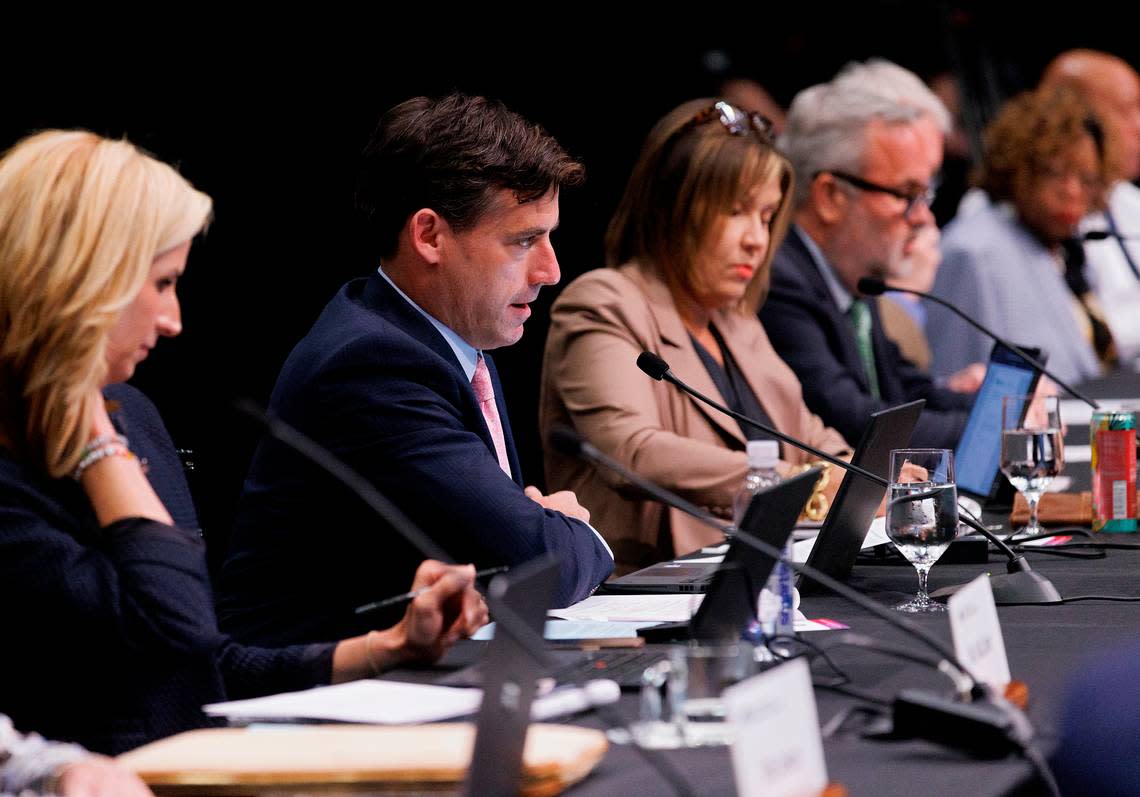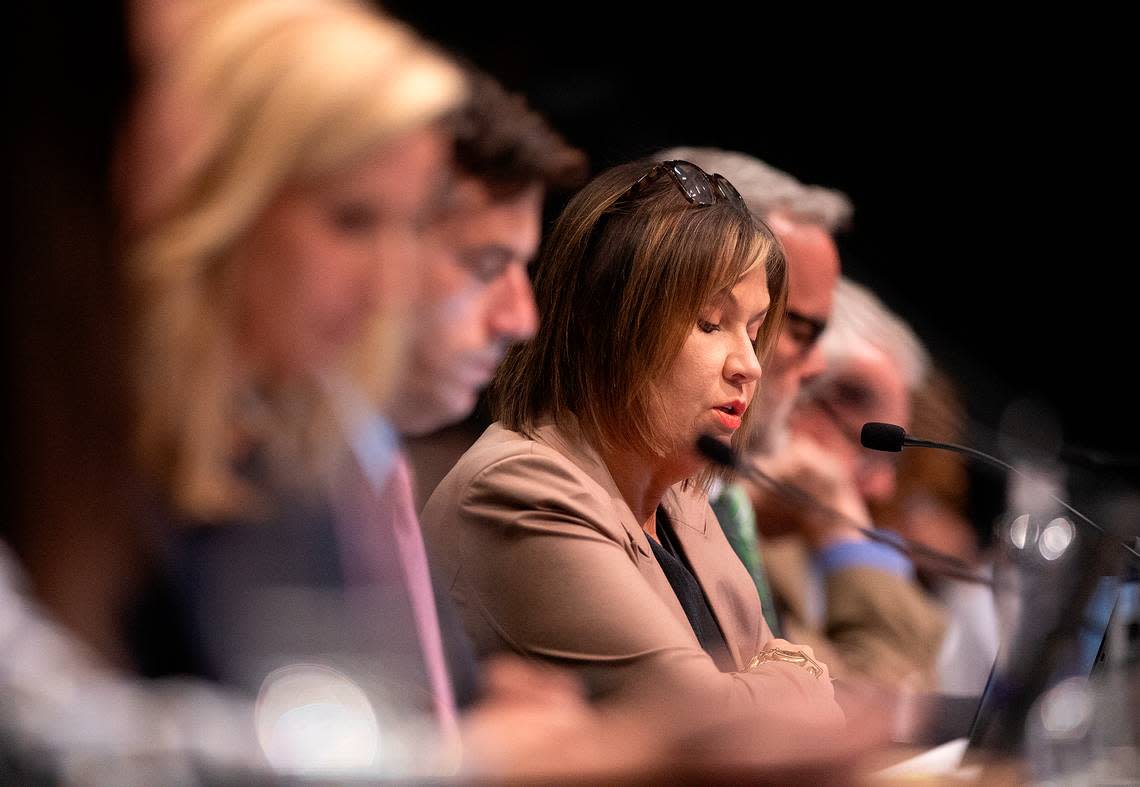UNC System board committee approves policy gutting DEI. Students say they were kept out.
Administrative positions and offices dedicated to diversity, equity and inclusion are likely to be eliminated at all public universities across North Carolina following a vote Wednesday by members of the board that oversees the campuses.
The UNC System Board of Governors’ University Governance committee approved a policy that repeals the university system’s existing policy and regulation on diversity and inclusion, which require each of the state’s 17 public campuses to employ diversity officers and work toward achieving diversity-related goals, among other requirements.
The committee passed the policy unanimously and with no discussion. The open-session portion of the meeting lasted about five minutes.
The new policy would eliminate those jobs — or, if a university wishes to keep the positions, it would be forced to remove the job’s ties to diversity. Campus centers dedicated to diversity would also likely be eliminated, though the policy allows universities to “implement programming or services designed to have a positive effect on the academic performance, retention, or graduation of students from different backgrounds.”
After the positions and offices are eliminated or changed, chancellors of each university would have to describe to UNC System President Peter Hans “reductions in force and spending” that resulted from the cuts, and how the “savings achieved” could be “redirected to initiatives related to student success and well-being.”
The policy states that the university system will “continue to ensure that diverse persons of any background, from North Carolina and beyond, are invited, included, and treated equally.” Universities would also continue to follow nondiscrimination policies and laws.
In a statement Thursday, Hans said the system “will continue serving students of all backgrounds and beliefs.”
“There is broad and deep commitment to that goal, and support for the UNC System’s longstanding efforts to reflect the diversity of North Carolina,” he said. “We have well-established laws and policies that prohibit discrimination, protect equal opportunity, and require a safe and supportive learning environment for all students. We will uphold those responsibilities.”
The policy now goes to the full, 24-member board for consideration at its May meeting. At that meeting, the policy is likely to be considered on the consent agenda, meaning the board could vote on the policy without further discussion.
If the full board approves the policy, it would take effect immediately. Chancellors would be required to certify they have made changes to align their campuses with the changes by Sept. 1.
The board’s action targeting diversity efforts is similar to that of Florida, which eliminated DEI on its public college campuses through legislation last year. According to the Chronicle of Higher Education, more than 80 anti-DEI bills have been introduced nationwide since 2023.

Faculty, students react to policy
Reaction to the policy — from both supporters and opponents — was swift online Tuesday night after the proposed policy came to light in a story published by The News & Observer.
That dialogue continued Wednesday, with students and faculty speaking out about the issue.
Two faculty leaders told The N&O Wednesday that, to their knowledge, faculty were not consulted on the policy or informed about it prior to it being added to the meeting materials Tuesday afternoon. The policy was not included in the materials when they were first posted last week.
Beth Moracco, faculty chair at UNC-Chapel Hill, said the new proposal took “us as a surprise,” and the quick turnaround from the policy being introduced to being voted on means that she and other faculty “have not really had a chance to digest and react to it.”
UNC-Chapel Hill spokesperson Kevin Best said in a statement that the university would “review the policy change and work with the UNC System on implementation if it is adopted in May.”
“As the Board of Governors noted, equality of opportunity in education and employment is a long-standing commitment of the University of North Carolina as a core value in service to our vibrant and growing state,” Best said. “As part of that mission, UNC-Chapel Hill will continue to welcome people from all walks of life with a variety of experiences and perspectives who come here to learn, work and live.”
Board of Governors Chair Randy Ramsey said in a statement Thursday that he expects “to see a lot of debate and feedback about this proposal over the next month, and questions about how it might affect each of our campuses.”
“I welcome the discussion and the opportunity to emphasize this Board’s commitment to equal opportunity and student success,” Ramsey said.
Wade Maki, a UNC Greensboro professor who chairs the UNC System Faculty Assembly, said faculty “look forward to having an opportunity to engage” with board members on the policy now that conversations around it have started publicly. Maki said he is under the impression that faculty and campuses will be able to provide input and feedback soon, likely in a forum outside of a formal board meeting.
Maki is concerned about the policy “because diversity is a key value” of many people in the system, he said.
“It’s foundational to what we do,” he said. “And it’s going to continue to be.”
Ramsey said the policy is intended “to protect the freedom of students and faculty to teach, research and advocate, while insisting that administrators follow the law when it comes to institutional neutrality,” the idea in state law that prevents universities from taking official stances on political matters or controversies.
“Our universities will support intellectual freedom, not promote a particular ideology,” Ramsey said.
The College Democrats of North Carolina urged students on X, formerly Twitter, to “stand up to the UNC Board of Governors” and “save programs on your campus” by contacting the UNC System office and Hans.
Jack Yordy, an Appalachian State University student who is also the state council chair for the state College Democrats, told The N&O that the policy is “kind of like another target of right-wing outrage of the month.” Yordy compared the move to previous legislation and policies in North Carolina and across the country targeting critical race theory, or CRT, and “woke and cancel culture.”
Yordy said ending diversity and inclusion efforts on campuses would have “an actual, real impact on the safety and well-being of students.”
“We want our college campuses to be a welcoming and safe place,” Yordy said.
Ramsey said that “welcoming students from all backgrounds makes our universities better and stronger.”
“North Carolina is a diverse state, and our public universities belong to everyone,” Ramsey said. “That means we cannot require everyone to think the same way about race, gender, or any other challenging topic.”

Some students say they were kept out of meeting
Students from the Southern Student Action Coalition and the UNC-Chapel Hill group TransparUNCy, which is dedicated to shining a light on political influences on North Carolina higher education, attempted to attend the meeting in-person. They told The N&O they were kept out of the UNC School of the Arts building where the meeting was held after being told by UNC System security that the meeting room was full.
UNC System spokesperson Andy Wallace told The N&O that some members of the public were unable to enter the meeting room because of a lack of available seats and because the open-session portion of the meeting, in which the vote took place, lasted for such a short time — roughly five minutes.
State law states that “any person is entitled to attend” open meetings. It is unclear whether exceptions are made when a room reaches its capacity. Asked by The N&O whether the room was filled to a point at which a fire code or other regulations would make the room unsafe, Wallace said only that the room was full.
Alexander Denza, an organizer with the group, told The N&O before the meeting that “it’s important that the Board of Governors knows that students are watching their changes.”
“These changes that they’re making right now are going to have a chilling effect on speech and also [on] discourse in our communities,” which he said is ironic given UNC-Chapel Hill and the broader UNC System’s recent goals of promoting open discourse.
Ramsey said the policy is “designed” to “encourage the free and open exchange of ideas, especially on difficult subjects.”
Denza said he is concerned about how vague the proposal’s language is, which he said could mean that the policy’s impacts might vary from campus to campus and allow administrators the ability to “work the language in the ways that best fits their agenda or situation.”
Samuel Scarborough, another UNC student who is a member of the group, said the group wanted to attend the meeting “to make our voices heard.”
“Knowing that institutionally, we don’t have as much power as we wish we had, we want to at least be present in the room as these decisions are happening and have a chance to speak,” Scarborough said. “We were not given this opportunity.”

Gov. Cooper addresses vote
Gov. Roy Cooper, a Democrat, issued a statement after the committee vote, saying:
“Our diversity should be used to highlight our state’s strengths, not our political divisions. Republican legislative and university leaders who attack diversity at our public universities are failing in their duty to protect students while threatening our ability to recruit top scientists, researchers and innovators who power our economy.”
Under state law, lawmakers in the General Assembly — which has been under Republican control since 2010 — appoint all voting members of the Board of Governors. Some groups, including the American Association of University Professors, have accused the board and the broader university system in recent years of being unduly influenced by conservative political connections.
The Board of Governors has also been criticized for its lack of diversity, with most members being white men.
Cooper in 2022 formed a bipartisan commission tasked with assessing how leaders are appointed to public university governance boards in the state and offer potential reforms. The commission was co-chaired by former UNC System presidents Margaret Spellings and Tom Ross.
The commission completed its work last summer, issuing a report with a host of recommendations that included increasing the size and diversity of the system-level Board of Governors and campus-level Boards of Trustees.
“The bipartisan Commission on the Governance of Public Universities found that a lack of diversity among university leadership and governance boards is both a disservice to students across the UNC System and leads to the controversy and volatility that we are seeing threaten our public universities,” Ross said in a statement Wednesday. “Our universities should encourage diversity on their campuses and governance boards and have leaders, administrators, faculty and staff that reflect the extraordinary diversity of our amazing state.”
In the Spotlight designates ongoing topics of high interest that are driven by The News & Observer’s focus on accountability reporting.
